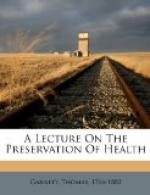Large towns are the graves of the human species; they would perish in a few generations, if not constantly recruited from the country. The confined, putrid air, which most of their inhabitants breathe, their want of natural exercise, but above all their dissipation, shorten their lives, and ruin their constitutions.
Children particularly, require a pure air; every circumstance points out the country as the proper place for their education; the purity of the air, the variety of rustic sports, the plainness of diet, the simplicity and innocence of manners, all concur to recommend it. It is a melancholy fact, that above half the children born in London, die before they are two years old.
To shew how indispensable fresh air is to children, I shall mention one example which sets the fact in the clearest light. In the lying-in hospital at Dublin, 2944 infants, out of 7650, died in the year 1782, within the first fortnight after their birth, which is nearly every third child; they almost all died in convulsions; many of them foamed at the mouth, their thumbs were drawn into the palms of their hands, their jaws were locked, the face was swelled and looked blue, as though they were choaked. This last circumstance led the physicians to conclude that the rooms in the hospital were too close, and hence, that the infants had not a sufficient quantity of good air to breathe; they therefore set about ventilating them better, which was done very completely. The consequence has been, that not one child dies now where three used to die.
Fewer children indeed die convulsed now, than formerly; this is because the rich learn, either from books, or conversation with physicians, how necessary fresh air is to life and health; hence they keep their houses well aired; but the poor, and servants, are not made to comprehend this matter properly; and therefore from neglecting to open their windows, and breathing a foul, tainted air, the greatest part of their time, many disorders are brought on, and others rendered worse than they naturally would be. [6]
Having considered the purity of the air, let us next take a view of the changes in temperature which it undergoes, and the effects which these have upon the constitution.
We find the air sometimes considerably below the freezing point; nay, even so much as 20 or 30 degrees; it is then intensely cold; and on the other hand, the thermometer sometimes indicates a great degree of heat. We then find ourselves much relaxed, and our constitutions exhausted.
To understand how this happens, let us consider for a moment the nature of heat, and cold.—Heat is one of those stimuli which act upon the excitability, and support life: for if it was totally withdrawn, we should not be able to exist even a few minutes; and cold is only a diminution of heat. When heat is present, in a proper degree, or the atmosphere is about that degree of heat which we call temperate,




